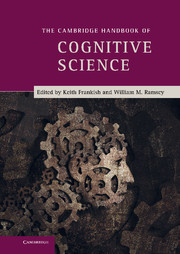Book contents
- The Cambridge Handbook of Cognitive Science
- The Cambridge Handbook of Cognitive Science
- Copyright page
- Contents
- List of figures and tables
- Contributors
- Acknowledgments
- Introduction
- Part I Foundations
- Part II Aspects of cognition
- Part III Research programs
- 12 Cognitive neuroscience
- 13 Evolutionary psychology
- 14 Embodied, embedded, and extended cognition
- 15 Animal cognition
- Glossary
- Index
13 - Evolutionary psychology
from Part III - Research programs
Published online by Cambridge University Press: 05 August 2012
- The Cambridge Handbook of Cognitive Science
- The Cambridge Handbook of Cognitive Science
- Copyright page
- Contents
- List of figures and tables
- Contributors
- Acknowledgments
- Introduction
- Part I Foundations
- Part II Aspects of cognition
- Part III Research programs
- 12 Cognitive neuroscience
- 13 Evolutionary psychology
- 14 Embodied, embedded, and extended cognition
- 15 Animal cognition
- Glossary
- Index
Summary
Keywords
- Type
- Chapter
- Information
- Publisher: Cambridge University PressPrint publication year: 2012
- 1
- Cited by

